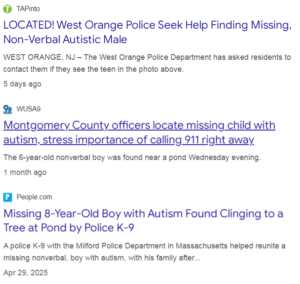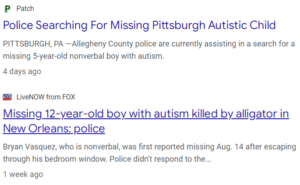
Is this because an intellectual disability contributes to nonverbal status, and ID alongside autism would be why they’re more prone to eloping?
When families talk about autism and safety, one of the most frightening topics is elopement — when a child suddenly runs or wanders away.
Nearly half of autistic kids attempt to elope at some point, according to research led by Anderson et al, published in Pediatrics (2012).
What stands out in these reports — and it’s also evident in the news — is that a large number of autistic children who elope are nonverbal.
There are exceptions, but they don’t surface too often.

A fair question is now raised: Does being nonverbal — in combination with elopement risk — mean the child (or teen, adult) has a low IQ or intellectual disability?
The reason this understandable question would come up is that a child, tween or teen with a significant ID would not understand why it’s dangerous to run off, even in the middle of the night in bare feet.
A significant intellectual impairment, which may in some cases partly explain the absence of spoken language, would also prevent them from understanding rules such as, “Don’t leave the house without first asking Mama or Dad,” or, “If you wander off without our permission, I’ll take away your videogames for a week.”

It’s Complicated
Being nonverbal doesn’t always mean a child or adult with ASD has an intellectual challenge.
Some autistic people who can’t speak have strong cognitive skills and are academically advanced, but their spoken communication challenges stem from differences in motor planning and sensory processing rather than a low scale of intelligence.
Certainly, you may have encountered at one point a child or adult with a severe intellectual deficit, but who was neurotypical, not autistic.
And that individual may have been a chatterbox, or at least, able to verbally express basic needs without a problem.
When I was a volunteer at a state mental hospital many years ago, there was a neurotypical (back then, known as “not autistic”) woman whose mental age was around preschool.
Conversation was not possible, but she was able to say, “I have to go to the bathroom” and “My brother Freddy’s coming to see me.” She was definitely verbal, despite the severe cognitive limitation.
With that said, studies do show that nonverbal autism and intellectual disability often overlap.
In fact, research led by Daniel L. Christensen, published in the MMWR Surveillance Summary (2016), found that around 31% of autistic kids have an intellectual disability (IQ below 70).
Though the study didn’t identify what percentage of that 31% was nonverbal and what percentage of the kids with average to above average IQs were also nonverbal, that 31% figure may make people believe that many nonverbal kids with autism struggle with understanding the danger of elopement or comprehending rules against elopement – due to a low IQ.
According to Frontiers in Psychiatry (2025), about 25-30% of autistic kids are nonverbal or minimally verbal (MV).
Some use assistive device technology to express themselves, while others are not capable of learning to use even a picture board.
What’s food for thought here is that the percentages in both populations – intellectual disability and nonverbal/MV – is about the same number.
There isn’t a single, large, nationally representative epidemiological paper that neatly cross-tabs ID with nonverbal/MV status for the same autistic individuals.
However, there are smaller studies (clinical, not population-based) that show a frequent overlap between ID and nonverbal/MV status.
For example, a chart review by Hellings et al in 2024 looked at 80 patients who all had the following two conditions:
- Minimally verbal
- Intellectual disability
It was then determined that out of this 80 who had these two conditions, 75 were autistic.
So out of this small clinical study, 94% of intellectually disabled, minimally verbal subjects also had ASD.
This study’s purpose was to produce guidance on treatments, but it also shows that not every minimally verbal person is autistic.
For instance, a neurotypical may have a genetic disorder that causes both ID and minimal speech, such as Angelman syndrome.
The study shows a pronounced overlap between autism and ID plus being minimally verbal.
But this doesn’t mean that all nonverbal or minimally speaking autistic people also have a low intelligence quotient.
Some have college education or otherwise work in fields that require at least average intelligence.
What may raise the issue is the propensity for elopement — at least in older childhood and especially adulthood — which suggests difficulty understanding basic safety, knowing how to dress appropriately and comprehending house rules.
Intuitively, we can say that an ID would make danger harder to recognize.
Plus, an ID would make it difficult to understand safety skills or threats of punishment for the elopement by a frustrated parent.
It does indeed seem quite incongruous that a nonverbal or minimally speaking autistic individual but with normal and especially higher intellect would not fully grasp the following concepts:
- Traffic safety; danger of wandering on a busy road.
- Inappropriateness of eloping barefoot, shirtless or too lightly clothed for the weather.
- The recklessness of leaving the house overnight.
- Failure to ask permission regarding exploring the neighborhood.
- Failure to ask if a parent or older sibling could accompany them on their excursion.
- Never leave home without your mobile device or communication technology.
- Appreciating house rules and understanding the consequences of breaking them.

Nothing Is Chiseled in Concrete
I’ve read in autism threads — from what were clearly Autistics with at least average intelligence — accounts of their elopement behaviors when young.
Many explain that they actually knew the dangers or rules, but eloped anyways — at times out of frustration or anger.
- But dashing out of the house from frustration and being gone for a while doesn’t necessarily constitute classic elopement.
- Even typical kids have been known to do this. Even typical adults, after a feud with their partner, will “take off” and be gone for hours.
Just because an autistic child leaves the house without telling anyone doesn’t mean this is elopement.
I’m autistic. I left my house as a child plenty of times to ride my bike without notifying my parents. Did this mean I eloped all throughout childhood?
A key difference could be that a truly eloping autistic child lacks the concept of returning home, and elopes under precarious circumstances such as late at night to go into a nearby pond.
Other reasons the forum users cite for their elopement include wanting to escape sensory overload in the house.
Another cited reason was the enjoyment of neighborhood exploring (though this is a blurry line; many neurotypical kids will do this and stay out for hours, worrying their parents to death).
Some also said they just didn’t know why; they simply had to get out of the house and acted impulsively.
In more genuine elopement cases, the child is often found in places that typical kids wouldn’t be, such as in a stranger’s backyard swimming pool, an apartment complex’s retention pond or alongside a heavily trafficked street.
The adult autistic posters in the threads I’ve read (and I haven’t read all of them) actually never cited being drawn to bodies of water for why they eloped as kids.
There’s also the possibility that a nonverbal child one day just wants to explore, with the intention of returning home shortly, but then gets lost.

Can elopement be prevented?
For nonverbal kids, especially those with ID, caregivers must rely on layers of safety strategies: locks, alarms, wearable trackers and neighborhood awareness campaigns.
The reality is that being nonverbal doesn’t automatically equal low intelligence, but the overlap between intellectual disability and nonverbal autism may help cast some light on why so many elopement cases involve nonverbal or MV status.
Summary: No long-term, population based investigation can definitively answer the question. Will we ever know just why the vast majority of autistic kids who elope are also nonverbal? But two questions to add to the mix:
- Could it be because autistic kids who can and do express wanting to go outside are quickly prevented by their parents, and thus, never go missing?
- Maybe it’s because when they express the desire, a family member accompanies them, and thus, never go missing?









































